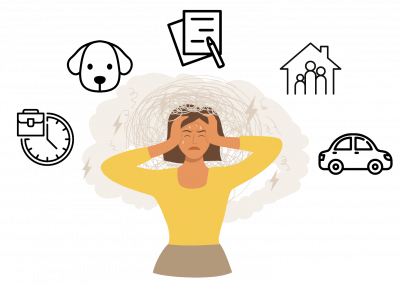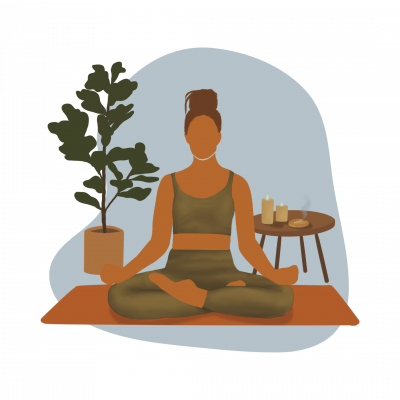What is stress?
According to the National Institute of Mental Health (NIMH), stress is defined as the physical or mental response to an external cause. Stressors can occur one-time or repeatedly. In addition, the NIMH defines anxiety as the body’s reaction to stress, even if there is no current threat.
Stress and anxiety can affect your sleep schedule by making it harder to fall asleep, stay asleep, or achieve quality sleep. Interrupted sleep can lead to fatigue, trouble concentrating during the day, and impaired judgement, which can further increase stress and anxiety. This anxiety-sleep cycle can have negative effects on your physical and mental health.
Below are sections from the NIMH’s information sheet, called “I’m so Stressed Out!”, that provides information on stress and how to manage it. The NIMH also has several resources on stress, anxiety, and mental health listed at the end of this page.

I’m So Stressed Out!
From the National Institute of Mental Health
Stress vs. Anxiety
Stress
- Generally is a response to an external cause, such as taking a big test or arguing with a friend.
- Goes away once the situation is resolved.
- Can be positive or negative. For example, it may inspire you to meet a deadline, or it may cause you to lose sleep.
Both Stress and Anxiety
Both stress and anxiety can affect your mind and body. You may experience symptoms such as:
- Excessive worry
- Uneasiness
- Tension
- Headaches or body pain
- High blood pressure
- Loss of sleep
Anxiety
- Generally is internal, meaning it’s your reaction to stress.
- Usually involves a persistent feeling of apprehension or dread that doesn’t go away, and that interferes with how you live your life.
- Is constant, even if there is no immediate threat.
Coping with Stress and Anxiety
Learning what causes or triggers your stress and what coping techniques work for you can help reduce your anxiety and improve your daily life. It may take trial and error to discover what works best for you. Here are some activities you can try when you start to feel overwhelmed:
- Keep a journal.
- Download an app that provides relaxation exercises (such as deep breathing or visualization) or tips for practicing mindfulness, which is a psychological process of actively paying attention to the present moment.
- Exercise, and make sure you are eating healthy, regular meals.
- Stick to a sleep routine, and make sure you are getting enough sleep.
- Avoid drinking excess caffeine such as soft drinks or coffee.
- Identify and challenge your negative and unhelpful thoughts.
- Reach out to your friends or family members who help you cope in a positive way.
Resources

National Institute of Mental Health. (2020). I’m So Stressed Out! Infographic (NIMH Identifier No. OM 20-4319). U.S. Department of Health and Human Services, National Institutes of Health. Retrieved December 29, 2024, from I’m So Stressed Out! Fact Sheet